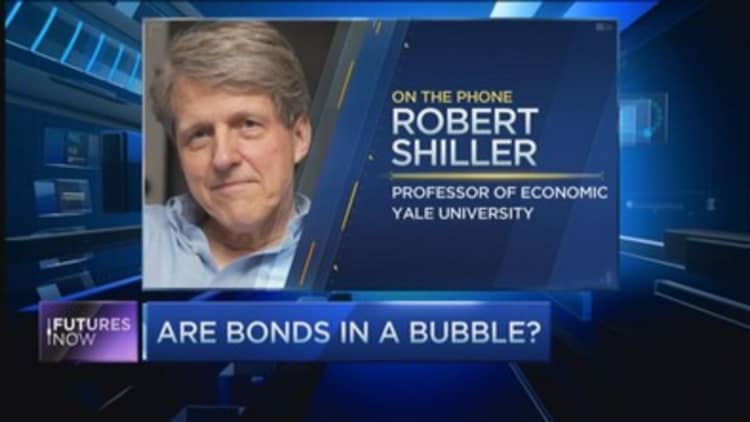
Robert Shiller has a new source of concern.
In the first edition of his landmark book "Irrational Exuberance," published in 2000, the Yale professor of economics and 2013 Nobel Laureate presciently warned that stocks looked especially expensive. In the second edition, published in 2005 shortly before the real estate bubble crashed, he added a chapter about real estate valuations. And in the new edition, due out later this month, Shiller adds a fresh chapter called "The Bond Market in Historical Perspective," in which he worries that bond prices might be irrationally high.
Noting that interest rates (which move inversely to prices) are extremely low given historical norms, Shiller writes: "The U.S. bond market, showing such low yields, looks as it if may have gone through something of a bubble, and may collapse further, eventually."
In a Thursday interview on CNBC's "Futures Now," Shiller said that if bonds are in a bubble, it's not sort of a gleeful frenzy that the word tends to conjure images of.
For Shiller, a bubble is "a social epidemic of enthusiasm and excitement spread by word of mouth, attracting more and more investors in a market. But I don't know that the bond market is really driven by excitement. Excitement of sorts—but it isn't so optimistic. I think it's mixed with a tinge of regret about 'Why am I getting such low yields?' "
Read More Robert Shiller's (depressing) advice for investors
So what's driving yields so low? Central banks have served a role by buying fixed-income securities, but he says there's more to it than that.
"The story is longer and deeper than that; it's not just central banks," Shiller said on Thursday. "It's something about our investment opportunities and our fears and our culture, so it's a very deep phenomenon. And the question in my mind is: Will it last?"
Not likely, says Shiller, given that many long-term bond yields around the world are fast approaching zero on an expected inflation-adjusted and even nominal basis.
"We can't go below zero, not far below zero," he said. "it seems to me this 'new normal' culture could last, but then it could crash."
"I think it's a risky time to be investing in long-term fixed income," the economist said.
Still, that doesn't mean that a crash in bond prices is around the corner.
"Yields have been trending down since 1981, over 30 years now," Shiller added in an email to CNBC on Thursday. "There could be a major turning point again in coming years, but I see no reason to think that such is imminent."
Watch "Futures Now" Tuesdays & Thursdays 1 p.m. ET exclusively on FuturesNow.CNBC.com!



